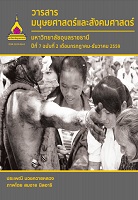การศึกษาเปรียบเทียบแนวคิดธรรมราชาจากคติทางพระพุทธศาสนากับลักษณะการปกครองในกวีนิพนธ์หลีเซา
Main Article Content
บทคัดย่อ
บทความนี้มุ่งศึกษาเปรียบเทียบแนวคิดธรรมราชาจากคติทางพระพุทธศาสนา กับลักษณะการปกครองในกวีนิพนธ์หลีเซา โดยการเปรียบเทียบนั้นจะใช้หลักธรรมราชาสาม หลักธรรมด้วยกัน อันได้แก่ ทศพิธราชธรรม อธิปไตย 3 และจักรพรรดิวัตร ผลการศึกษาปรากฎว่าหลักธรรมดังกล่าวสอดคล้องกับลักษณะการปกครองในกวีนิพนธ์หลีเซาทางด้านผู้นำประเทศ และบรรดาขุนนางผู้ปกครองในรัฐฉู่ ซึ่งสะท้อนให้เห็นถึงลักษณะเด่นชัด ของการปกครองที่ขาดธรรมอันนำไปสู่ความล่มสลายของบ้านเมือง จากเหตุการณ์ดังกล่าว แสดงให้เห็นว่า ทศพิธราชธรรม อธิปไตย 3 และจักรพรรดิวัตร เป็นจริยวัตรที่ผู้นำ หรือ บรรดาขุนนางผู้ปกครองทั้งหลายจะประพฤติยึดเหนี่ยวเป็นหลักธรรม หรือเป็นคุณธรรมประจำตนของผู้ปกครองบ้านเมือง เพื่อให้มีความเป็นไปโดยธรรม และยังประโยชน์สุขให้เกิด แก่ประชาชน
Comparative Study of the Concept of Lord of Law in Buddhism with the Governances’ Form in the Poem Li Sao
The objective of this academic article was to compare the concept of the lord of law in Buddhism with the governances’ form in the poem, Li Sao. This comparison was based on the three core principles of the lord of law, consisting of the virtues of the King, the three of sovereignty, and the empire observances five. The article found that the three core principles were in accord with the governances’ form in the poem, Li Sao, in terms of the sovereign nobleman and ruler in Chu state. This reflected features prominently of the government and led to the collapse of the
Article Details
บทความที่ได้รับการตีพิมพ์เป็นลิขสิทธิ์ของวารสารมนุษยศาสตร์และสังคมศาสตร์ มหาวิทยาลัยอุบลราชธานี
ข้อความที่ปรากฏในบทความแต่ละเรื่องในวารสารวิชาการเล่มนี้เป็นความคิดเห็นส่วนตัวของผู้เขียนแต่ละท่านไม่เกี่ยวข้องกับมหาวิทยาลัยอุบลราชธานี และคณาจารย์ท่านอื่นๆในมหาวิทยาลัยฯ แต่อย่างใด ความรับผิดชอบองค์ประกอบทั้งหมดของบทความแต่ละเรื่องเป็นของผู้เขียนแต่ละท่าน หากมีความผิดพลาดใดๆ ผู้เขียนแต่ละท่านจะรับผิดชอบบทความของตนเองแต่ผู้เดียว


